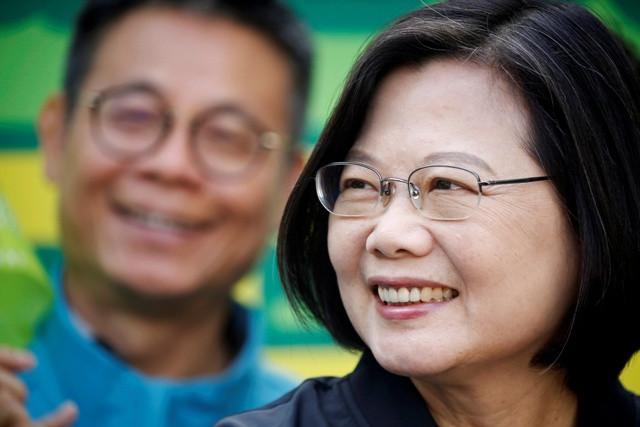Taiwan's President Tsai Ing-wen departed for the United States on Wednesday, reiterating her commitment to global engagement despite China's threats of retaliation should she meet US House Speaker Kevin McCarthy. China, which claims Taiwan as part of its territory, has consistently cautioned US officials against meeting Tsai, interpreting such actions as support for Taiwan's quest for international recognition.
In response to then-US House Speaker Nancy Pelosi's visit to Taipei last August, China conducted military exercises around Taiwan. During Tsai's trip, Taiwan's military is closely monitoring potential Chinese activity. Tsai's itinerary includes stops in Guatemala and Belize, with layovers in New York and Los Angeles. Although unconfirmed, she is anticipated to meet McCarthy in California.
"External pressure will not hinder our determination to go to the world," Tsai declared at Taoyuan International Airport, indirectly addressing China. She continued, "We are calm and confident, will neither yield nor provoke. Taiwan will firmly walk on the road of freedom and democracy and go into the world. Although this road is rough, Taiwan is not alone."
Zhu Fenglian, spokesperson for China's Taiwan Affairs Office, warned of the consequences of Tsai's potential meeting with McCarthy, stating that it would "seriously violate the one-China principle, harm China's sovereignty and territorial integrity, and destroy peace and stability in the Taiwan Strait." Zhu also expressed China's strong opposition and intention to "resolutely fight back," although no specifics were provided.
Tsai's transits coincide with the United States' strained relationship with China, which has been described by some analysts as the worst since Washington normalized ties with Beijing in 1979 and shifted diplomatic recognition from Taipei. Taiwan remains China's most sensitive territorial matter, causing friction between Beijing and Washington, which maintains only unofficial ties with Taipei. Nonetheless, US law requires the provision of defense capabilities to Taiwan.
Senior US officials have urged China not to overreact to Tsai's planned transits, asserting that such events are customary. One senior US official noted that Tsai has participated in various activities during her previous transits, including meetings with Congress members, the Taiwanese diaspora, and other groups, adding, "So there's absolutely no reason for Beijing to use this upcoming transit as an excuse or a pretext to carry out aggressive or coercive activities aimed at Taiwan."
Taiwanese presidents frequently travel through the United States en route to visiting diplomatic allies in Latin America, the Caribbean, and the Pacific. Although these are not official visits, they often facilitate high-level meetings. Taiwan's government disputes China's sovereignty claims, and President Tsai has consistently offered dialogue with Beijing while asserting that only the people of Taiwan can determine their future.
Taiwanese security agencies have expressed concern about Tsai's trip, fearing that China may initiate a series of influence campaigns, including disseminating misinformation on social media platforms to manipulate public opinion regarding Tsai's US transit. An internal memo from a Taiwanese security agency reviewed by Reuters indicated that China had previously used large-scale influence campaigns, including cyberattacks against Taiwan during Pelosi's visit last year. Taiwan's authorities anticipate Beijing will intensify its "cognitive operations" in the coming days.
China's Taiwan Affairs Office did not immediately respond to requests for comment. On Sunday, China celebrated another diplomatic victory over Taiwan when Honduras, a former Taiwan ally, switched diplomatic recognition to Beijing. Currently, only 13 countries maintain formal ties with Taiwan.
China maintains that both it and Taiwan belong to "one China" and that, as a Chinese province, the island has no right to any state-to-state relationships. Taiwan vehemently disagrees with this perspective.





